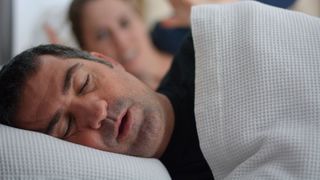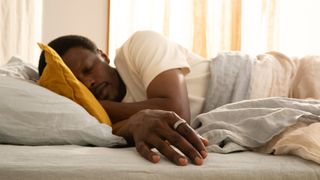Think you have sleep apnea? Experts share the 5 main symptoms and what to do
Loud snoring is just one of the main hallmarks of sleep apnea

Sleep apnea is a condition where your breathing stops and starts while you're sleeping, and it affects over 936 million people worldwide. Because sleep apnea is so common, it's likely that you or your partner, or someone you know, may suspect that you have this sleep disorder. But what are the symptoms?
It can be difficult to know whether you have sleep apnea because it only occurs during sleep. However there are some major signs that could point towards you having sleep apnea – especially if you have more than one of these symptoms.
We recently spoke to Joshua Piper, Sleep Clinician at ResMed UK, and Dr Carleara Weiss, Sleep Science Advisor at Aeroflow Sleep, to learn about the major symptoms of sleep apnea. We also asked them what you should do if you think you have sleep apnea, what the risk factors are, and what common treatments are available.
What is sleep apnea?
Sleep apnea is a common disorder which interrupts your breathing during sleep, sometimes for seconds or even minutes, cutting off oxygen to the brain and body. Sleep apnea is divided into two types: Obstructive Sleep Apnea (OSA), and Central Sleep Apnea (CSA).
According to Sleep Clinician Joshua Piper, the condition is serious but often overlooked, which can have serious consequences. "It can lead to beyond disrupted sleep, making you feel drained and increasing your risk of heart disease, strokes, and other significant health issues," explains Piper.
"The most shocking part? Most people don’t even know they have it until they start seeking help for constant fatigue or other symptoms."

"Obstructive Sleep Apnea happens when the muscles in the throat relax and block the air passage," explains Sleep Advisor Dr Weiss. "As a consequence, less air gets into the lungs and reduces the oxygen levels reaching the brain. The brain then reacts by making you cough or gasp for air to wake you up enough to breathe properly."
Central Sleep Apnea is a less common type of sleep apnea, with over 70 million globally estimated to have it, compared to the 936 million estimated to have OSA. While both types are characterized by interrupted breathing during sleep, Dr Weiss says the difference lies in the cause: "CSA is when the brain fails to send the correct signals to the muscles responsible for breathing."
The 5 major symptoms of sleep apnea
1. Nighttime awakenings
Due to interrupted breathing decreasing the level of oxygen to your brain and body, your brain will respond by jolting you awake. The result? Disrupted sleep characterised by frequent nighttime awakenings.
"This is a subtle symptom, especially for women who might not realise the link between disrupted sleep and apnea," Piper notes. While Piper says some may not remember waking up throughout the night, Dr Weiss says that others may wake up coughing or gasping for air.
2. Waking up with a headache and dry mouth
If you've been waking up with a sore throat, dry mouth or a morning headache, these could be signs that your night has been disrupted by sleep apnea. A sore throat or dry mouth is often caused by excessive mouth breathing during sleep as a result of a blocked nasal passage.
Meanwhile headaches result from the supply of oxygen levels to the brain being cut off. "Waking up with a headache could point to high carbon dioxide levels," explains Piper. "A common consequence of apnoea that’s often dismissed as just poor sleep or stress."

3. Daytime fatigue or moodiness
As sleep apnea leads to frequent awakenings throughout the night, this can result in sleep deprivation. "Feeling tired even after a full night’s sleep is a red flag," says Piper. "It’s a sign that your body isn’t getting enough restorative sleep. This can happen even if you think you’ve been in bed for hours."
Dr Weiss also points out that this fatigue can also result in changes to behaviour and demeanor, with many sleep apnea patient exhibiting mood swings and irritability.
4. Pauses in breathing during sleep
Interrupted breathing is pretty much the calling card of sleep apnea, coming to define the disorder. Of course, as it occurs while you're asleep, it can be hard to tell if this is happening to you or not. "If your partner notices that you stop breathing or start gasping during sleep, this is a key symptom of sleep apnoea."
However, this can be tricky if you live alone or don't share a bedroom with anyone. If you don't have anyone who can observe your breathing as you sleep, Piper suggests other ways to monitor your breathing: "Try out sleep monitoring apps, which are now available with most smart watches or phones."
5. Loud snoring
"This is the hallmark of sleep apnoea," says Piper. "It signals an obstructed airway." According to the sleep clinician, it is particularly common for men. "But don’t be fooled — some women snore quietly, and their apnoea often goes unnoticed."
So, if you share a bed with a partner who constantly complains about your snoring, this may be a tell-tale sign that you have OSA. If you live alone, try making an audio recording of yourself while you sleep.
- Read more: Amazon is making a smart pillow to treat sleep apnea symptoms — here's what we know so far
- Read more: FDA approves first ever medication for obstructive sleep apnea— here's what that means
What causes sleep apnea?
According to Piper, sleep apnea is typically caused by a combination of factors. For many, sleep apnea is linked to physical traits like a narrow airway, large tonsils, or a thick neck. However, there are some lifestyle factors that can put you at risk, too.

"Lifestyle factors ranging from weight gain to alcohol consumption to sleeping on your back can worsen the condition," he says. "It’s a frustrating cycle, as disrupted sleep leads to more health complications, and some of the causes, like weight gain, can be both a symptom and a trigger."
In addition to physical traits, back sleeping, excess weight, and alcohol consumption, the NHS say the following are also risk factors of sleep apnea:
- smoking
- consuming sleeping pills
- having other family members with sleep apnoea
- age
- gender
What to do if you think you have sleep apnea
If you notice the above symptoms and suspect that you indeed have sleep apnea, Dr Weiss advises you should speak to a specialist to see if they can give you a diagnosis.
"Having these symptoms persistently," she says. "Despite changing other health behaviors or regardless of having other conditions such as the flu or a cold, is suggestive of OSA and a sign to find a sleep specialist for a comprehensive assessment. This assessment includes a lab-based or at-home sleep study."
Once assessed, you and your doctor can work together to find the right treatment plan. You can learn more about common therapies and how to access them with our sleep apnea treatment guide.
Sign up to get the BEST of Tom's Guide direct to your inbox.
Get instant access to breaking news, the hottest reviews, great deals and helpful tips.

Frances Daniels is a PPA-accredited journalist and Sleep Staff Writer at Tom's Guide with an MA in Magazine Journalism from Cardiff University. Her role includes covering mattress and sleep news and writing sleep product reviews and buyer's guides, including our Best Hybrid Mattress 2024 guide. She is hugely interested in the relationship between good sleep and overall health, interviewing a wide array of mattress and sleep experts to create well-informed articles about important topics such as nutrition, sleep disorders (from sleep apnea to night terrors), lucid dreaming, sleep hygiene, and mattress care. She is also our specialist on mattress toppers — producing mattress topper reviews and taking care of our Best Mattress Toppers 2024 guide — and takes the lead on all content related to fiberglass-free mattresses for a clean, non-toxic sleep.